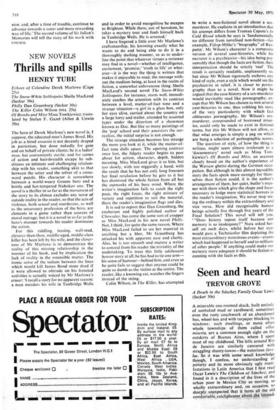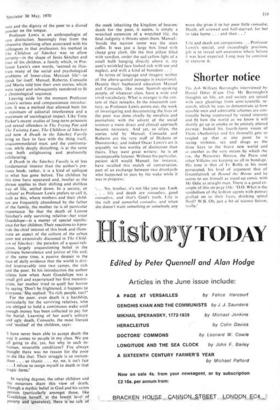Seen and heard
TREVOR GROVE
A Death in the Sanchez Family Oscar Lewis (Seeker 30s)
A miserable one-roomed shack, built entirely of sunbaked mud or cardboard; sometimes even the rusty coachwork of an abandoned bus, wheel-less and with tarpaper blocking its windows: such dwellings, or more often whole townships of them called villas miseria, are a common enough sight on the outskirts of Buenos Aires, where I spent most of my childhood. The hills around Rio de Janeiro are similarly cancered with straggling shanty-towns—the notorious fave- las. So it was with some- small knowledge though, I confess, no understanding of poverty and its more obviously ugly mani- festations in Latin America that I first read Oscar Lewis's The Children of Sanchez; and found in it a description of the lives of the urban poor in Mexico City so moving, so wholly extraordinary and, on occasion, so sharply unexpected that it turns all the old comfortable, catchphrases about the blessed-
ness and the dignity of the poor to a dismal powder on the tongue.
Professor Lewis is an anthropologist of rare distinction. Seemingly free from the obsessive theorising often associated with his colleagues in that profession, his method in The Children of Sanchez was to allow poverty—in the shape of Jesus Sanchez and four of his children, a family which, in Pro- fessor Lewis's own words, 'seemed to illus- trate many of the social and psychological problems of lower-class Mexican life'—to speak for itself. Manuel, Roberto, Consuelo and Marta told him their own stories, which were taped and subsequently reordered to fit a chronological sequence.
Leaving aside for the moment Professor Lewis's serious and compassionate introduc- tion, it was a method that allowed both for a minimum of editorial interference and a maximum of sociological impact. Like Tony Parker's recent studies of long-term prisoners and sexual offenders in The Frying Pan and The Twisting Lane, The Children of Sanchez and now A Death in the Sanchez Family bring us face to face with the thing itself, unaccommodated man; and the confronta- tion, while deeply disturbing, is at the same time both enlightening and profoundly exhilarating.
A Death in the Sanchez Family is of less fundamental interest than the author's pre- vious book; rather, it is a kind of epilogue to what has gone before. The children by this time have separated and, insofar as the phrase applies to their shifting and shiftless way of life, settled down. In a society, or 'culture' as Professor Lewis prefers to call it, such as this, where mothers and their child- ren are frequently abandoned by the father of the family, the mother tie is of particular importance So that the death of Lenore Sanchez's only surviving relative—her sister Guadalupe—is a matter of special signific- ance for her children.Their reactions to it pro- vide the chief interest of this book and illum- inate an aspect of the culture of the urban poor not extensively discussed in The Child- ren of Sanchez: the paradox of a quasi-reli- gious, largely unquestioning belief in the ultimate benevolence and justice of life and, at the same time, a passive despair in the face of daily evidence that the world is divi- ded irretrievably into two camps, the rich and the poor. In his introduction the author relates how when Aunt Guadalupe was a small girl and experienced her first menstru- ation, her mother tried to quell her horror by saying 'Don't be frightened, it happens to everyone.' She replied: 'To rich people, too?' For the poor, even death is a hardship, particularly for the surviving relatives, who are obliged to hold a continuous wake until enough money has been collected to pay for the burial. Learning of her aunt's solitary and ugly death, Consuelo, the most literate and 'studied' of the children, says:
'I have never been able to accept death the way it comes to people in my class. We are all going to die, yes, but why in such in- human, miserable conditions? I've always thought there was no reason for the poor to die like that. Their struggle is so tremen- dous . . . so titanic . . . no, no, it isn't fair ... I refuse to resign myself to death in that tragic form.'
in varying degrees, the other children and the mourners share this view of death. Though a mythic belief in God and his saints persists (particularly amongst those, like Guadalupe herself, at the lowest level of poverty and ignorance), there is no talk of the meek inheriting the kingdom of heaven; death for the poor, it seems, is simply a wretched extension of a wretched life, the final indignity it thrusts upon them. Manuel: 'Inside the narrow room was the open Coffin. It was just a large box lined with cheap grey cloth. On the thin pillow filled with sawdust, under the sad yellow light of a small bulb hanging directly above it, my aunt's wrinkled face looked sick with use and neglect, and with a kind of boredom ..
In terms of language and imagery neither of the above-quoted passages is exceptional. Despite their haphazard education Manuel and Consuelo, like most Spanish-speaking people, of whatever class, have a wide and vivid vocabulary. What is stranger is the con- tent of their remarks. In the nineteenth cen- tury, as Professor Lewis points out, the work of investigating and documenting the lives of the poor was done chiefly by novelists and journalists; with the advent of the social sciences a more direct and clinical approach became necessary. And yet, so often, the stories told by Manuel, Consuelo and Roberto are the very stuff of Dickens or Dostoievsky; and indeed Oscar Lewis's art is arguably no less worthy of distinction than theirs. They were great writers: he is an incomparable listener. Without his particular, patient skill would Manuel, for instance, have recalled this snatch of conversation, part of an exchange between two drunkards who happened to pass by the wake while it was in progress:
. No, brother, it's not like you say. Look . . . life and death are comadres, good comadres, and that's God's truth. Life is the rich and powerful comadre, and when she doesn't want something or somebody any more she gives it to her poor little comadre, Death, all screwed and half-starved, for her to take home . . . and then . .
Life and death are companions ... Professor Lewis's special, and exceedingly precious, gift is to reveal self-awareness where before it was least expected. Long may he continue to exercise it.



































 Previous page
Previous page